Costa Cruises
 | |
| Subsidiary | |
| Industry | Transportation |
| Founded | 1854 |
| Headquarters | Genoa, Italy |
Key people |
|
| Products | Cruises |
| Parent | Carnival Corporation & plc |
| Website | costacruise.com |
Costa Crociere S.p.A. (Italian pronunciation: [ˈkɔsta kroˈtʃɛːre]), trading as Costa Cruises (Italian: Costa Crociere), is an Italian cruise line, based in Genoa, Italy, and under control of the Carnival Corporation & plc.[1][2]
Founded in 1854,[3] the company originally operated cargo ships, in order to carry olive oils and textiles from Sardinia to Liguria.[3] In 1924 the company passed to founder's sons (Federico, Eugenio and Enrico) that started commercial activities, buying the ship Ravenna.[3] Commercial activities continued until the introduction of passenger services in 1947, with regular services between Italy and South America. The company later converted its entire fleet to full-time cruising, and as an independent company became one of the largest cruise operators in Europe. Acquired by Carnival Corporation in 2000, Costa Cruises is now one of ten brands operated by Carnival and accounts for approximately 16% of its revenue.[4]
Today, as Costa Cruises Group, the company is one of the main operating companies in the Carnival group, with executive control of the groups activities in Europe. The company is responsible for operation of Costa Cruises in Italy, and AIDA Cruises in Germany and was formerly responsible for the operation of Ibero Cruises in Spain. AIDA was previously a subsidiary of P&O Princess Cruises, being transferred to Costa following the merger of Carnival Corporation and P&O Princess in 2002. Ibero Cruises is a new brand, created in 2007 as a joint venture between Carnival Corporation and Orizonia Group.
The Costa Cruises brand currently operates fifteen cruise ships, which all sail under the Italian flag and provide cruise holidays in the Mediterranean, Northern Europe, the Caribbean, the Indian Ocean, the Middle East, South East Asia and South America.
The company gained international attention on January 13, 2012 when one of its cruise ships, the Costa Concordia, ran aground and capsized off the coast of Italy, because Captain Francesco Schettino wanted to 'salute' the Italian island of Giglio off Tuscany with a close sail past at night. The captain was one of the crew to leave the sinking ship early while many passengers were still on board. The ship was left lying on its starboard side in shallow water. Thirty-two persons have been confirmed dead.[5] Six weeks later the company made headlines again when a fire on Costa Allegra left it drifting without power for 13 hours in waters near Somalia frequented by pirates, before the ship was taken under tow.
On July 27, 2014, after tugboats had slowly towed the wreck of the Costa Concordia 200 miles (320 kilometers) north from the island of Giglio over a period of five days, the Costa Concordia arrived in its home port of Genoa, Italy, for eventual scrapping.[6] The total cost of the disaster is estimated to be over $2 billion, including $500 million for the loss of the ship and $1.5 billion for the salvage and recovery operations. On February 11, 2015, Captain Francesco Schettino was found guilty by an Italian court of multiple manslaughter, causing the shipwreck, and abandoning his passengers and was sentenced to 16 years in prison.[7] An Italian appeals court on May 31, 2016 upheld the 16-year prison sentence.[8]
Market position
As of 2015, according to Scott Knutson, vice president of sales and marketing for Costa Cruises North America, Costa was “... uniquely positioned as the only international brand that hasn’t adapted its product to the American market. That authenticity allows us to go to a certain segment of the market. It’s those vacationers who like the international experience — the food, the wine, the service." Italians accounted for 25 to 30 percent of bookings on most Costa cruises, and they were followed by passengers from France, Germany and Spain. Depending on the season or destination, North Americans could make up 5 to 15 percent of the passenger list. The "universal" language on board was English.[9]
Fleet
Current fleet
Mistral class
| Ship | Built | Builder | Entered service for Costa | Gross tonnage | Flag | Notes | Image |
|---|---|---|---|---|---|---|---|
| Costa neoRiviera[10] | 1999 | Chantiers de l'Atlantique | 2013–Present | 48,200 | | Previously Mistral for the failed Festival Cruises and Grand Mistral For Iberocruceros.[11] | |
Classica class
| Ship | Built | Builder | Entered service for Costa | Gross tonnage | Flag | Notes | Image |
|---|---|---|---|---|---|---|---|
| Costa neoClassica | 1991 | Fincantieri | 1991–Present | 52,926 | | Originally Costa Classica, received a €18 million refit in 2014 and renamed Costa neoClassica. Will leave the fleet in March 2018.[12] | 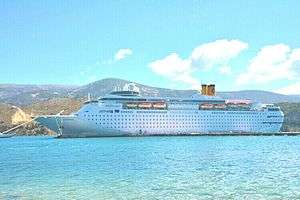 |
| Costa neoRomantica | 1993 | Fincantieri | 1993–Present | 56,769 | | Originally Costa Romantica, received a €90 million refit in 2012 and renamed Costa neoRomantica | 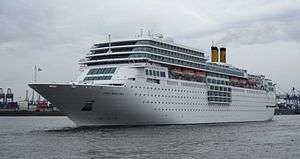 |
Victoria class
| Ship | Built | Builder | Entered service for Costa | Gross tonnage | Flag | Notes | Image |
|---|---|---|---|---|---|---|---|
| Costa Victoria | 1996 | Bremer Vulkan | 1996–Present | 75,166 | | Similar to Norwegian Sky and Norwegian Sun. |  |
Atlantica class
| Ship | Built | Builder | Entered service for Costa | Gross tonnage | Flag | Notes | Image |
|---|---|---|---|---|---|---|---|
| Costa Atlantica | 2000 | Kværner Masa-Yards Helsinki New Shipyard | 2000–Present | 85,619 | | Panamax form factor | 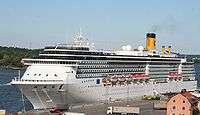 |
| Costa Mediterranea | 2003 | Kværner Masa-Yards Helsinki New Shipyard | 2003–Present | 85,619 | | Panamax form factor | 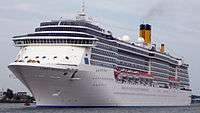 |
Luminosa class (Vista Class)
| Ship | Built | Builder | Entered service for Costa | Gross tonnage | Flag | Notes | Image |
|---|---|---|---|---|---|---|---|
| Costa Luminosa | 2009 | Fincantieri | 2009–Present | 92,700 | | Hybrid design between Spirit and Vista-class ships | |
| Costa Deliziosa | 2010 | Fincantieri | 2010–Present | 92,700 | | Hybrid design between Spirit and Vista-class ships |  |
Fortuna (Triumph) class
| Ship | Built | Builder | Entered service for Costa | Gross tonnage | Flag | Notes | Image |
|---|---|---|---|---|---|---|---|
| Costa Fortuna | 2003 | Fincantieri | 2003–Present | 102,587 | | Identical to Carnival Triumph and Carnival Victory |  |
| Costa Magica | 2004 | Fincantieri | 2004–Present | 102,587 | | Identical to Carnival Triumph and Carnival Victory |  |
Concordia class
| Ship | Built | Builder | Entered service for Costa | Gross tonnage | Flag | Notes | Image |
|---|---|---|---|---|---|---|---|
| Costa Serena | 2007 | Fincantieri | 2007–Present | 114,500 | | Concordia-class |  |
| Costa Pacifica | 2009 | Fincantieri | 2009–Present | 114,500 | | Concordia-class | |
| Costa Favolosa | 2011 | Fincantieri | 2011–Present | 114,500 | | Modified Concordia-class |  |
| Costa Fascinosa | 2012 | Fincantieri | 2012–Present | 114,500 | | Modified Concordia-class |  |
Diadema (Dream) class
| Ship | Built | Builder | Entered service for Costa | Gross tonnage | Flag | Notes | Image |
|---|---|---|---|---|---|---|---|
| Costa Diadema | 2014 | Fincantieri | 2014–Present | 132,500 | | Currently the largest ship built for Costa Cruises. Currently Costa Crociere's flagship. Modified Dream Class | _(cropped).jpg) |
Future Ships
| Ship | In Costa service | Builder | Gross tonnage | Flag | Notes | Image |
|---|---|---|---|---|---|---|
| Unnamed | 2019 | Fincantieri | 135,000 | | Will be built specially for the Chinese market.[13] | |
| Unnamed | 2019 | Meyer Turku | 183,200 | | Will be the largest ship to be built for Costa Cruises. | |
| Unnamed | 2020 | Fincantieri | 135,000 | | Will be built specially for the Chinese market.[13] | |
| Unnamed | 2021 | Meyer Turku | 183,200 | | Will be the largest ship to be built for Costa Cruises. |
Former Fleet
| Ship | In Costa service | Notes | Image |
|---|---|---|---|
| Anna C I | (1948–1971) |  | |
| Anna C II | (1971-1981) | Built in 10.1955 at Wilton-Fijenoord, Schiedam yard in the Netherlands. LOA 150.3m, 19.2m, DWT 10,272, Flag Panama, Class Registro Italiano Navale. Sold in 1981 to Chaldeos Freighters Ltd and renamed Damenham. Sold to Geofman International for demolition. Broken up at Gadani beach on 2 June 1984. | |
| Andrea C | (1948–1981) |  | |
| Luisa C | (1947–1951) | ||
| Maria C | (1947–1953) | .jpg) | |
| Franca C | (1952–1977) |  | |
| Flavia | (1968–1982) | | |
| Federico C | (1958–1983) |  | |
| Fulvia C | (1969–1970) | ||
| Giovanna C | (1947–1953) | ||
| Italia | (1974–1983) | 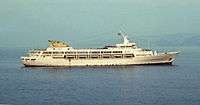 | |
| Bianca C | (1959–1961) | explosion and shipwreck | .jpg) |
| Carla C | (1967–1985, 1986–1992) | 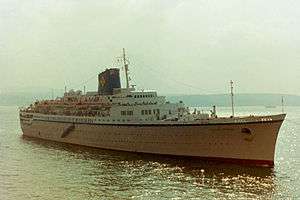 | |
| Columbus C | (1981–1984) |  | |
| Danae | (1979–1992) | | |
| Daphne | (1979–1997) |  | |
| Enrico C/Enrico Costa | (1965–1994) |  | |
| Eugenio C | (1966–1996) | 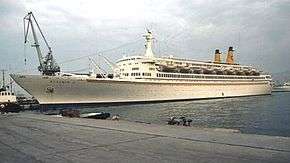 | |
| Costa Riviera | (1981–1993, 1994–2002) | .jpg) | |
| Costa Olympia | (never entered service) | Originally ordered for Costa Cruises but following the financial collapse of the shipyard the hull was sold to Norwegian Cruise Lines and became Norwegian Sky. | .jpg) |
| Costa Playa | (1995–1998) |  | |
| Costa Tropicale | (2001–2005) | .jpg) | |
| Costa Europa | (2002–2010) | _(cropped).jpg) | |
| Costa Marina | (1988–2011) |  | |
| Costa Concordia | (2006-2012) | Ran aground, capsized and partially sunk. Later deemed a total constructive loss and is in the process of scrapping. | |
| Costa Splendor | (never entered service) | Originally ordered for Costa Cruises but transferred during construction to Carnival Cruise Lines and became Carnival Splendor. |  |
| Costa Allegra | (1989-2012) | .jpg) | |
| Costa Voyager | (2011-2013) | | |
| Costa Celebration | (never entered service) | On the day before the ship was scheduled to depart on its inaugural voyage, the vessel had been sold to an unnamed buyer which turned out to be Bahamas Paradise Cruise Line. | .jpg) |
Summer 2015 Itineraries
Western Mediterranean
- Costa Diadema: Naples, La Spezia, Savona, Marseille, Barcelona & Palma De Mallorca.
- Costa Fascinosa: Savona, Civitavecchia, Palermo, Ibiza, Palma De Mallorca & Barcelona.
- Costa Magica: Savona, Marseille, Tangier, Casablanca, Cádiz, Lisbon & Valencia .
- Costa neoRiviera: Savona, Toulon, Propriano, Olbia, Trapani, Valletta, Salerno, Capri & Portoferraio.
Eastern Mediterranean
- Costa Deliziosa: Venice, Bari, Corfu, Mykonos, Santorini & Dubrovnik.
- Costa Mediterranea: Trieste, Split, Kotor, Argostoli, Corfu & Dubrovnik.
- Costa neoClassica: Venice, Split, Corfu, Santorini, Athens, Istanbul, Izmir, Mykonos, Argostoli & Dubrovnik.
Norwegian Fjords
- Costa Favolosa: Copenhagen, Hellesylt, Geiranger, Bergen, Kristiansand, Oslo & Warnemünde.
- Costa Pacifica: Kiel, Hellesylt, Geiranger, Honningsvag, Tromso, Leknes, Trondheim, Andalsnes & Bergen.
- Costa Fortuna: Amsterdam, Bergen, Hellesylt, Geiranger, Andalsnes, Olden, Flåm & Stavanger.
- Costa neoRomantica: Hamburg, Haugesund, Kristiansand, Bodø, Sortland, Narvik, Leknes & Flåm.
Baltic Sea
- Costa Pacifica: Kiel, Stockholm, Helsinki, Saint Petersburg, Tallinn, Riga, Klaipeda & Gdynia.
- Costa Luminosa: Stockholm, Helsinki, Tallinn & Saint Petersburg.
Asia
- Costa Serena
- Costa Atlantica
- Costa Victoria
Accidents and incidents
See also Carnival Cruises Accidents and incidents for incidents associated with the parent company's other cruise operations.
Costa Concordia sinking

On January 13, 2012, Costa Concordia ran aground off Isola del Giglio, Tuscany. The ship capsized and partially sank, killing 32 people. In 2014, the ship was parbuckled and refloated with caissons, and in July 2014 it was towed to its home port of Genoa, where it will be dismantled and eventually scrapped.
Costa Allegra engine room fire, ship adrift
On February 27, 2012, Costa Allegra suffered an engine room fire and went adrift in the Indian Ocean. After several days adrift without power, the ship was towed to the Seychelles island of Desroches but was unable to dock there. She was then towed to Mahé, Seychelles, where the passengers disembarked. No casualties were reported.
On 9 March 2012, it was announced that Costa Allegra would not return to service with Costa, and she was given to Themis Maritime Ltd ship company.[14] In late 2012, Costa Allegra was beached at Aliaga, Turkey, for scrapping.[15]
Gallery

References
Notes
- ↑ "Company profile." Costa Cruises. Retrieved on January 20, 2010.
- ↑ "Dati Societari." Costa Cruises. Retrieved on 15 January 2012. "Sede legale: Piazza Piccapietra 48, 16121 Genova - Italia"
- 1 2 3 "Costa Concordia Collision". DubaiBlog. 2012-01-14.
- ↑ "2012 World Wide Market Share". Cruise Market Watch. 2011-11-20.
- ↑ "Cruise ship Costa Allegra adrift off Seychelles". BBC News Online. Retrieved 27 February 2012.
- ↑ "Costa Concordia reaches Genoa's main port for scrapping after 200-mile journey from wreckage site". The Independent. 27 July 2014.
- ↑ "Costa Concordia captain Schettino guilty of manslaughter". BBC World News. 11 February 2015.
- ↑ "Costa Concordia "Captain’s Prison Sentence Upheld by Italian Court"". Time. 31 May 2016. Retrieved 10 August 2016.
- ↑ Shillinglaw, Greg (March 30, 2015). "Sailing Italian Style". TravelPulse.com. Retrieved April 14, 2015. External link in
|work=(help) - ↑ "Overnights and unusual destinations mark new Costa project".
- ↑ "Grand Mistral South America season cancelled, ship transferred to Costa".
- ↑ https://www.cruiseindustrynews.com/cruise-news/17567-costa-confirms-victoria-back-to-europe-neoclassica-sold.html
- 1 2 http://www.cruiseindustrynews.com/cruise-news/13433-carnival-announces-newbuilds-for-costa-princess-and-pao-australia.html
- ↑ Hannah Sampson (10 March 2012). "Micky Arison on Costa Concordia accident: "I am very sorry it happened."". The Miami Herald. Retrieved 19 March 2012.
- ↑ Gene Sloan (9 March 2012). "Fire-damaged cruise ship Costa Allegra will not return.". USAToday. Retrieved 19 March 2012.
Bibliography
- Ceserani, Gian Paolo; Piccione, Paolo (1998). Costa Crociere: cinquant'anni di stile [Costa Cruises: fifty years of style] (in Italian). Cinisello Balsamo, Milano: Silvana Editoriale. ISBN 8882150976.
- Dellacasa, Erika (2012). I Costa: storia di una famiglia e di un'impresa [The Costas: the story of a family and a business] (in Italian). Venezia: Marsilio Editori. ISBN 9788831713030.
- Peter, Bruce (2012). Costa Cruises. Ramsey, Isle of Man: Ferry Publications. ISBN 9781906608408.
- Piccione, Paolo, ed. (2002). Costa crociere: ritratto di una flotta : storia per immagini delle navi Costa [Costa Cruises: portrait of a fleet: picture story of the Costa ships] (in Italian). Cinisello Balsamo, Milano: Silvana Editoriale. ISBN 888215386X.
- Piccione, Paolo; Fochessati, Matteo (2003). Crociere nell'Arte: arte a bordo delle navi Italiane [Cruising into art: art on board Italian liners] (in Italian and English). Genova: Tormeno. ISBN 8884800595.
- Piccione, Paolo; Ceserani, Gian Paolo; Palazzini, Fiora Steinbach (2008). Sessant'anni di crociere Costa: 1948-2008 [Sixty Years of cruising with Costa: 1948-2008] (in Italian). Cinisello Balsamo, Milano: Silvana Editoriale. OCLC 860565092.
External links
| Wikimedia Commons has media related to Costa Cruises. |
- Costa Cruises Corporate
- Costa Cruises Official Website
- Costa Cruises fleet location in Google Maps
- Costa Line – Linea "C" Page 1A – The Early Liners 1948–65
